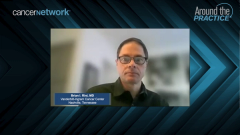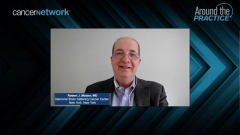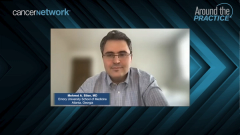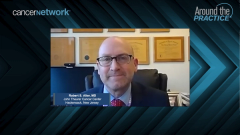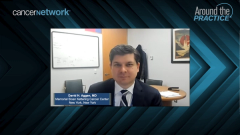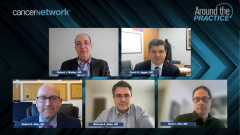
Discontinuing IO/IO Therapy in Intermediate-Risk Renal Cell Carcinoma
Shared insight on the adverse event profile of immunotherapy combination regimens in renal cell carcinoma, including advice on when it is appropriate to discontinue therapy.
Episodes in this series

Transcript:
Robert J. Motzer, MD: Bob, [Robert S. Alter, MD], you've used ipilimumab and nivolumab extensively in your clinical practice. Can you speak to the adverse event profile for ipilimumab and nivolumab combination therapy and also some of your management strategies around the common toxicities?
Robert S. Alter, MD: I think when you look at the CheckMate 214, I think it definitely is easily applicable to our practice. We do see some type of toxic manifestation. I think in the clinical trial, 97%-98% patients did experience some toxicity, either grade 1 unfortunately to grade 5. We do see fatigue, pruritus, and I think we see diarrhea as well. Sometimes, you do believe that this is more of the CTLA4 toxicity, because a lot of times, when they go on maintenance nivolumab, toxicities do abate, such as rash and some GI [gastrointestinal] toxicities with anorexia. For nausea and vomiting, not as much. The laboratory abnormalities, the lipase elevation, hyperthyroidism, hand-foot syndrome we see as well. I think just really being tuned in to the immune-mediated toxicities, those being with the skin, the liver, the kidney, and the androgen toxicities. We mentioned the pulmonary toxicities; I think that this really falls upon the healthcare providers to be aware–not only for our own monitoring of the patient, but we have to teach the patients and their family members as well. I really think the minimization of these toxicities can be more geared toward communication that you can have with the patients, both in the clinics as well as when they're at home. In the clinical trial, I think 35% patients required use of steroids. Patients have come off the study based upon some toxicities as well. I think the most important thing is identifying the toxicities, and I think that's something before we even talk about initiation of therapy, we stress to the patients very much. Since we've been using these therapies for several years—my colleagues have been using this for melanoma and lung cancer have been using it longer than patients with RCC [renal cell carcinoma]—so we learn from their experiences. I think we have to be able to grade the toxicities. It’s important to recognize at what point, when you go through the algorithms, can you continue to treat the patients and just add on some complementary medications to suppress some of the toxicities or adjust some of the endocrinopathies? When do you have to hold the therapy, and when do we apply usage of steroids, and what dosing of the steroids? And then more importantly, at what toxicity grade does one have to discontinue the therapy? I think the case that David [David H. Aggen, MD] just presented was a perfect example of a patient who had toxicities where you can actually hold therapy. And when Dr Tannir [Nizar M. Tannir, MD, FACP, Department of Genitourinary Medical Oncology, Division of Cancer Medicine, University of Texas MD Anderson Cancer Center] actually presented the data at several ASCO [American Society of Clinical Oncology] meetings already. There is a subset of patients who discontinued therapy due to toxicities and remained in a complete remission. So, I think the benefit about recognizing the therapies is really focusing on the patient itself and hoping, of course, that the benefit of the therapies can still linger for patients, and not feeling that you must reinstitute therapy based upon their positive response.
Robert J. Motzer, MD: Thanks very much. So, that is in terms of managing toxicities. So now Brian [Brian I. Rini, MD] in your clinical practice, the numbers for who actually discontinues ipilimumab and nivolumab are relatively high, right? What in your own experience are some of the adverse events that result in a hard stop? How do you make that decision for patients for a hard stop for ipilimumab and nivolumab, saying no more? What are the adverse events for that?
Brian I. Rini, MD: Yes, it's a good question. I don't know that I have a line in the sand necessarily across all patients, and I think sometimes it depends on how much therapy have they gotten and what their response is. My threshold to stop is much lower if they're in a deep response and if we're 6, 9, 12 months out or if they're in a deep response. Maybe even annoying grade 2 toxicity like rash or some LFT [liver function test] abnormalities, I might talk to the patient knowing as was just discussed that such patients can stay off therapy and often do well for a long time, and that's the best place to be: that that treatment-free survival range so to speak. I think when you get pneumonitis, certainly myocarditis, when you get critical organ involvement, that's probably a hard stop. Also, recurrent colitis. I've had a bit more of an issue with arthralgias with maintenance nivolumab. I don't know if you guys have experienced the same thing, but I've had, when out early on in the CheckMate 214 days or even the study before that, I had patients where I probably kept the maintenance nivolumab going too long and they got more crippling arthralgia. I've become very sensitive to stopping that very early and using that as a bit of a line in the sand. Again, most of those patients almost by definition are into their maintenance. They're responding in some respect, and so I feel pretty comfortable telling those patients that the benefit-risk balance is getting less and less in their favor if I continue treating them, and they might be able to stay off therapy for months or years by stopping now. So again, not necessarily 1 specific toxicity aside from again, maybe the obvious of something like pneumonitis or myocarditis, but pending the patient and also the depth of response.
Transcript edited for clarity.
Newsletter
Stay up to date on recent advances in the multidisciplinary approach to cancer.


